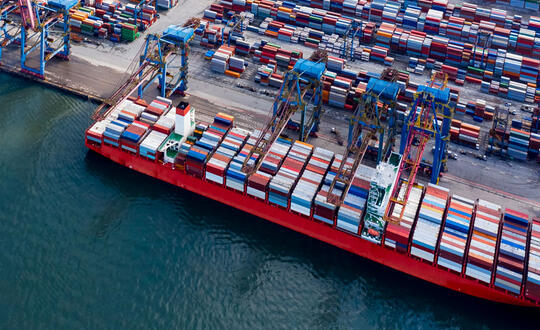Exporters Reviewing Compliance Programs Amid Rise in Enforcement Scrutiny, Lawyer Says (Export Compliance Daily)
Jun 22 2023
Note: This interview with Womble Bond Dickinson partner Alan Enslen first published on Export Compliance Daily on June 14, 2023.
A ramping up of U.S. export enforcement efforts is causing companies to revisit their compliance practices, particularly as the Bureau of Industry and Security conducts more outreach to exporters, said Alan Enslen, a trade lawyer with Womble Bond. He said companies are more frequently auditing their export compliance programs amid a number of signs that the Biden administration is increasing scrutiny on potential export violations, including a multi-agency memo issued in March that Enslen said was a “shot across the bow” for U.S. exporters.
That memo, the first sanctions guidance jointly issued by the Commerce, Treasury and Justice departments, warned industry about common Russian evasion efforts and described a range of red flags businesses should monitor (see 2303020054). It was also a “deliberate statement” to industry that the three agencies will be cooperating on export control and sanctions issues not just involving Russia, Enslen said, but likely around a range of issues for the foreseeable future.
“We've encouraged companies to realize the regulatory enforcement agencies are not just working together on Russia sanctions circumvention and export controls circumvention,” Enslen said during a recent interview. “This is the way it's going to be going forward.”
“Companies realize it's not enough just to make sure that we have a compliance program."
The three agencies are “clearly more intertwined and working together on enforcement cases,” he said, which means “compliance has to keep up.” Enslen said he’s seeing more companies auditing their compliance programs, conducting tailored compliance training and taking a “comprehensive look at their supply chain” for potential export control or sanctions risks.
“I think that's one of the most significant aspects that has come out of this,” he said. “Companies realize it's not enough just to make sure that we have a compliance program, that we're doing the right thing. They suddenly realize and appreciate that downstream matters and upstream matters in terms of their potential exposure.”
The joint compliance note has been coupled with a “deliberate uptick” in outreach from the BIS Office of Export Enforcement, Enslen said, an observation echoed by other trade lawyers (see 2303240060). He said the increase in BIS’ company visits might stem from the agency’s recent changes to its administrative enforcement policies, including one change that could reward companies that tip off BIS about their competitors’ wrongdoings (see 2304180071). BIS is hoping to receive more tips, and that becomes “a lot easier” if exporters “know their local OEE agent,” Enslen said. “We're certainly seeing a more robust outreach from OEE,” he said, adding Homeland Security Investigations is also conducting more visits.
Along with incentivizing exporters to send BIS tips, the agency is also seeking to encourage voluntary disclosures by increasing penalties on companies that fail to disclose a “significant” potential violation, a change outlined in an April memo from Matthew Axelrod, BIS’ top export enforcement official. If companies are aware of a significant violation and don’t disclose it, Axelrod said, BIS will now count that as an aggravating factor when calculating a potential penalty.
“There just seems to be a swell of overlapping compliance requirements that are very policy-driven and very prone to change."
Enslen said he has received “a lot of questions” about whether that means BIS will also include in its aggravating factors cases in which a company doesn’t find out about a significant violation before the government does. Enslen believes that’s an “over[1]reading” of the memo. “The undiscovered, inadvertent violations are not really what this memo is about,” Enslen said. “This is specifically about deliberate decisions to not disclose.”
He also said he’s receiving questions from clients about how they should determine whether a potential violation rises to the level of “significant” under Axelrod’s memo, or whether their violation has the “potential for national security harm,” which could lead to a higher penalty. While some cases are “obvious,” Enslen said others may exist in more of a “gray area.”
BIS is likely searching for violations with a nexus to the semiconductor sector or to emerging technologies controlled under the Export Control Reform Act, he said. A violation is also likely to cause national security harm if it has touchpoints to certain sensitive regions, Enslen said, such as Russia, China, Iran or North Korea, Enslen said.
Those countries are “going to get more attention, more emphasis, more resources,” Enslen said, especially as BIS looks to increase its corporate enforcement. A series of recent export control indictments, including several for illegal shipments to China and Russia, were “just the beginning” of enforcement actions expected to be brought by BIS and DOJ this year, Axelrod said last month (see 2305170033).
“It's certainly an active time, to say the least,” Enslen said. “There just seems to be a swell of overlapping compliance requirements that are very policy-driven and very prone to change, so it’s quite a challenge for companies, particularly those with any kind of global footprint.”